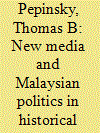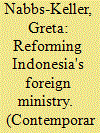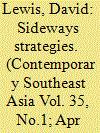| Srl | Item |
| 1 |
ID:
119225


|
|
|
|
|
| Publication |
2013.
|
| Summary/Abstract |
This essay is a critical examination of the ability of Malaysia's new media to promote political liberalization. Drawing on a historical approach to Malaysia's political development since independence, it argues that the political effects of the rise of Malaysia's new media are best understood as being parallel to those of modernization and socio-economic change from previous decades, which augured important changes in the political strategies of incumbent and opposition politicians, but did not upset the fundamental logic through which the Barisan Nasional (BN) regime has ruled since the 1970s. That logic of rule is closely attuned to Malaysia's cleavage structure, which centres on ethnicity and the economy and which has pervaded ?the country's politics since independence. Malaysia's new media - despite being far more open to critical voices than its establishment print and broadcast media - serve as venue in which more basic political conflicts are waged. Although Malaysia's 13th General Elections may spell further losses for the ruling BN, this essay argues that the rise of Malaysia's new media is unlikely to be responsible for political liberalization. Instead, liberalizing pressures are most likely to be effective when groups targeting democratic processes and procedures, thereby superseding Malaysia's cleavage politics.
|
|
|
|
|
|
|
|
|
|
|
|
|
|
|
|
| 2 |
ID:
119227


|
|
|
|
|
| Publication |
2013.
|
| Summary/Abstract |
Hedley Bull's distinction between diplomatic and cosmopolitan culture, though insufficiently developed, has two applications in the context of the Association of Southeast Asian Nations (ASEAN). It provides a broader theoretical backdrop to the oft-noted need for a thicker socio-cultural underpinning to counterweigh ASEAN's elite diplomatic culture; and it offers an alternative perspective with which to critique ASEAN-focused efforts in that direction. This article uses the diplomatic/cosmopolitan dyad to examine a range of regional communication initiatives, from cartoons and computer games to Facebook communities and curricula. While some still represent an essentially diplomatic culture that has simply been transferred to a popular environment, others have the potential to promote a more genuinely cosmopolitan vision that better enables citizens to come to terms with both the rough and the smooth of regional cooperation. The article suggests that ASEAN would be well advised to promote hands-off communicative efforts that not only give participants scope to explore, but also accommodate the ineluctability of contention and difference in regional affairs.
|
|
|
|
|
|
|
|
|
|
|
|
|
|
|
|
| 3 |
ID:
119224


|
|
|
|
|
| Publication |
2013.
|
| Summary/Abstract |
More than a decade after Indonesia's democratic transition, the effects of domestic politics on the conduct of Indonesia's foreign policy continue to attract scholarly attention. Relatively less attention, however, has been given to the foreign ministry, the principal institutional actor responsible for foreign policy formulation and management of Indonesia's external relations. This article argues that this neglect is a mistake: institutional changes within the foreign ministry, together with the emergence of new ideas, have played a key role in transforming the country's foreign policy. It was principally within the foreign ministry that significant attempts were made to change Indonesia's national self-image so that it better reflected the values of the reformasi experience. This article explores how democratic norms have been internalized in both the organization of the foreign policy bureaucracy and in the conceptualization of Indonesia's external identity.
|
|
|
|
|
|
|
|
|
|
|
|
|
|
|
|
| 4 |
ID:
119223


|
|
|
|
|
| Publication |
2013.
|
| Summary/Abstract |
Studying individuals who move from civil society into government in an effort to pursue reform agendas provides important "bottom up" insights into the complexity of policy processes. Using a set of original life history data collected in the Philippines, this article analyses the experiences of such crossover reformist efforts in post-Marcos Philippines in the field of agrarian reform. Taking each of the four governments of the period in turn, a set of themes are discussed including entryism as a political strategy, political patronage, organizational culture, role transitions and activist identities. The article concludes with the idea that the boundary between state and civil society is an important, relatively unexplored area of political activity. By opening up this area as an arena of contentious politics, an ethnographic approach tells us more about the challenges and complexity encountered by those attempting to influence policy processes from the inside, and about the policy process itself as a non-linear phenomenon.
|
|
|
|
|
|
|
|
|
|
|
|
|
|
|
|
| 5 |
ID:
119222


|
|
|
|
|
| Publication |
2013.
|
| Summary/Abstract |
This article examines why Asia's multilateral defence diplomacy has been a relative laggard when compared to other forms of institutionalized security dialogue, and what explains its recent rise. It argues that explanations that stress the "catalytic role" of external shocks such as the Asian Financial Crisis (AFC) or changes in the distribution of power or threats are underdetermining. Rather, Asia's new multilateral defence diplomacy reflects strategic emulation on the part of ASEAN elites, who localized ideas initially put forward by outsiders in order to maintain ASEAN's central place in the regional security architecture. Its rise has also been helped by the changing role of militaries in some East Asian states and its rapid institutionalization owes much to historical contingency, in particular the interests of two influential ASEAN Chairs in Indonesia and Vietnam. The final part of the article briefly assesses the future prospects and influence of regional multilateral defence diplomacy.
|
|
|
|
|
|
|
|
|
|
|
|
|
|
|
|